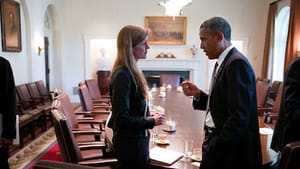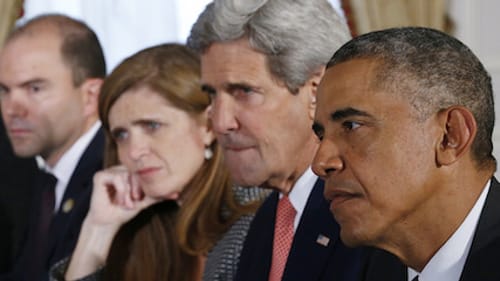Stay in the Loop
BSR publishes on a weekly schedule, with an email newsletter every Wednesday and Thursday morning. There’s no paywall, and subscribing is always free.
A simpler time and film
Greg Baker's 'The Final Year' looks back at the Obama presidency

At this point, even the most cynical political realist is probably ready to indulge in some poignant nostalgia. That’s where Greg Baker’s The Final Year, a comprehensive tell-all documentary detailing the final months of the Obama White House comes in, evoking that faraway glimmer of hope that still held many of us in its thrall less than two years ago.
It’s increasingly difficult to get through the near-apocalyptic 24-hour news cycle this year without feeling a sense of dread regarding our country’s future. President Barack Obama embodied a new dawn for U.S. relations abroad after the disastrous Bush years, reestablishing accountability and confidence as leader of the free world. By comparison, his successor represents a complete regression into racially divisive rhetoric, jeopardizing the very existence of people of color and other historically underrepresented communities.
Missed opportunities
That's why it's so disappointing to see that despite Baker’s unparalleled level of access to certain members of the Obama administration, his film remains unsatisfying.
From a cinematic standpoint, the quality of footage is inconsistent. Considering the caliber of its subjects, one might be inclined to overlook this flaw, but the commander-in-chief and several within his inner circle are also notably missing from much of the film.
It could be more accurately described as a character study of the foreign-policy experts who surrounded Obama during his presidency: its true subjects are Secretary of State John Kerry, U.S. Ambassador to the United Nations Samantha Powers, and Deputy National Security Advisor (and speechwriter) Ben Rhodes. Sure, these people are interesting in their own right, but the film never delivers on its promise of an inside look at the Obama White House; even Vice President Joe Biden and First Lady Michelle Obama are excluded.
The tumultuous 2016 election cycle turned many of us into political junkies, but it was easier to tune out when things were running smoothly. If that was your experience, be warned that this film requires a fairly comprehensive knowledge of Obama-era foreign affairs. That focus may have been an intentional choice by the filmmaker, or perhaps it was because the individuals to whom he gained access primarily worked on this area of policy.

Still, it seems like a tremendous oversight to include no coverage of domestic policy. There are never any explanations beyond broad overviews excerpted from interview subjects, so the viewer must bring their own external knowledge into the film.
The film is also disorganized in terms of the order of information and stories covered; it’s loosely chronological but mainly segmented by policy issue, and never really comes together.
Out of touch
But its fatal flaw is that it is extremely one-sided, not only politically (although it certainly presents a Democratic perspective) but also in that it fails to criticize the Obama presidency’s faults.
While foreign affairs were clearly Baker’s focus, does this in some ways reflect that president’s tenure? Is it possible that the Obama administration was so concerned with policing the globe and repairing international relations that they are partially to blame for the 2016 Republican election sweep?
For better or worse, this documentary shows how out of touch the past administration was with much of its constituency. Though Rhodes’s statement that “climate change is a bigger threat than terrorism” might be logical, it demonstrates the disconnect between D.C. policy wonks and the average American.
This raises another important question: can we ever truly find a balance between the two, or will one always take precedence over the other?
Ultimately, this film is only as effective as the perspective from which you approach it. If viewed as part of a broader dialogue involving the hubris of the Democratic establishment in failing to stop the Trump threat, it can be an effective conversation starter. Unfortunately, most people will likely see it as only having superficial value and, depending on their party affiliation, either agreeing or disagreeing with its politics.
What, When, Where
The Final Year. Greg Baker directed. Available to stream on YouTube, Amazon Video, and Google Play.
Sign up for our newsletter
All of the week's new articles, all in one place. Sign up for the free weekly BSR newsletters, and don't miss a conversation.

 Rob Buscher
Rob Buscher